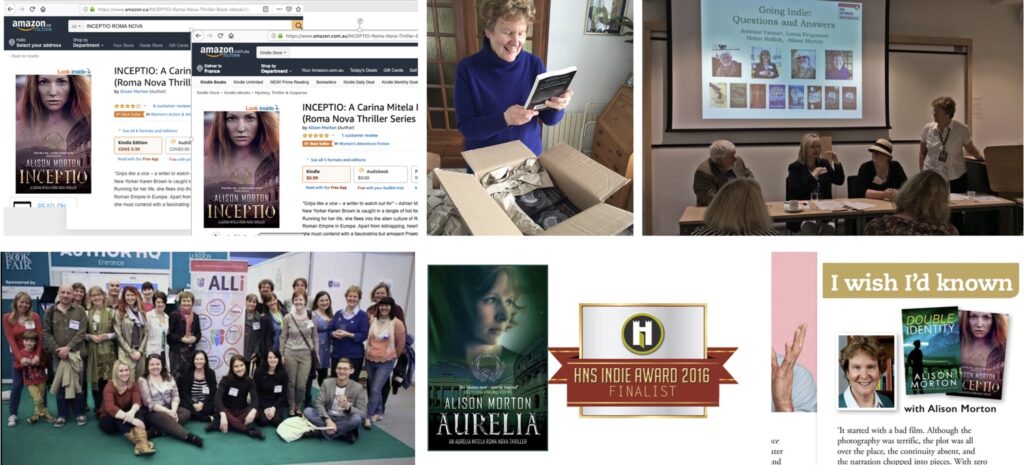A ‘successful author’ – what does that mean?
Selling gazillions of books and getting an orange Bestseller label on Amazon?
Selling gazillions of books with only 8% of the proceeds but with the backing of a big publisher?
Running your own writing and publishing business – the mistress (or master) of your own universe?
Getting a three-book contract?
‘Bagging’ an agent?
Asked to contribute to a writing magazine?
Opening your first box of books?
Being invited to speak at a writing conference or give a library or bookshop talk?
Fifty 5-star reviews on Amazon?
Recognition by your fellow writers as a giver and collaborator?
Recognition in a literary magazine?
Getting the story you’ve been itching to write into print?
Fulfilling a life dream?
Earning your first £100 /$100 payment from a book retailer?
Reaching a six-figure income?
Setting up your own printing imprint or company?
Being a social media book star?
Many writers are shy creatures and say they just want to write and that any of the above would be ‘nice’. Many are thrilled to hold the first book out of the box that arrived at the front door. They hug the beautiful rectangle to their chest and close their eyes hardly believing that this book actually exists. (That’s me every time.)
If they sell ten books at a writing fair, they are very pleased. They’ve probably had a fulfilling day talking to the public about the book, its world, their writing journey and hearing about other people’s writing.
Others look at the height of the coloured bars on a retailer’s report and try to work out why ten books are marked as sold one week, none the next and thirty the following. But if the total reaches 100 units (ebook, print, audio, etc.) each month, they are happy. Others think only a 1,000 sold is a very poor month.
So here’s the crux of it: success means very different things to different people.
Some writers set out to make a living and possible more; others are pleased to have (or need) a bit of extra income. Some spend hours on social media and advertising platforms refining their marketing skills and aiming for high sales. Some writers write for fun or to interact with other like-minded people; others burn to get a message out. Some want to win the Booker prize; others are happy to be known as the spinner of a good yarn (and we’re not talking knitting here.)
Two things about success
Only you can know why you write. You may be happy to tell others a worldly reason and keep the real motivation a warm little secret inside you, or the other way round. (Many of us do this…)Thus, only you will know what success means for you. And you are captain of your own starship boldly going, so you are the only person able to measure that success.
Do NOT compare yourself with others
This is very bad for your mental health and can spoil the pleasure you get from your writing. It doesn’t matter if Freda Bloggs goes on about selling 3,000 books on publication day. Does she actually get more pleasure than you do from the twenty you sold? You might think so, but perhaps you sold those twenty to people you spoke to, people you know will treasure your book. Quite a lot of commercial success comes from previous books sales, a marketing department and a big advertising spend, but above all, luck. Their commercial success could be transient, while yours could be steady and perhaps longer lasting.
How to be successful
Work out what your goals are; they could be any from the list at the top of this post or something completely different. And when you achieve that goal, celebrate! Next, set another goal or milestone if you are setting out a path.
‘Sell lots of books’ is too vague; sell 200 books in six months is much better. ‘Win a book prize’ is similarly unspecific but send in an entry to ten competitions is much better.
And the good old favourite: write the next book. Readers like consistency and if they like one of your books, they’ll buy another. And another. Whether you’re after reviews and prizes, or book sales and chart rankings, this is the best way to make a mark towards your chosen goal.
Happy writing!
Alison Morton is the author of Roma Nova thrillers – INCEPTIO, CARINA (novella), PERFIDITAS, SUCCESSIO, AURELIA, NEXUS (novella), INSURRECTIO and RETALIO, and ROMA NOVA EXTRA, a collection of short stories. Audiobooks are available for four of the series.Double Identity, a contemporary conspiracy, starts a new series of thrillers. JULIA PRIMA, a new Roma Nova story set in the late 4th century, is now out.
Find out more about Roma Nova, its origins, stories and heroines and taste world the latest contemporary thriller Double Identity… Download ‘Welcome to Alison Morton’s Thriller Worlds’, a FREE eBook, as a thank you gift when you sign up to Alison’s monthly email update. You’ll also be among the first to know about news and book progress before everybody else, and take part in giveaways.














Leave a Reply